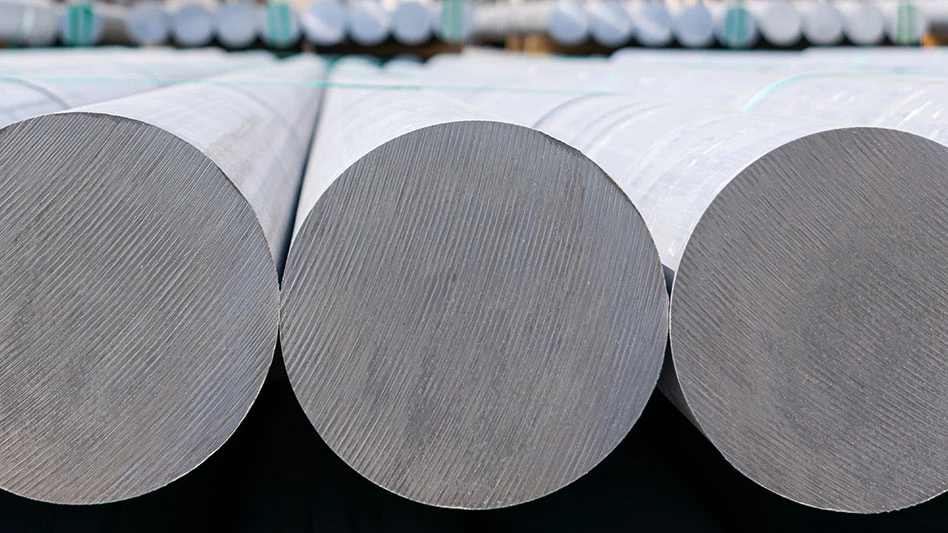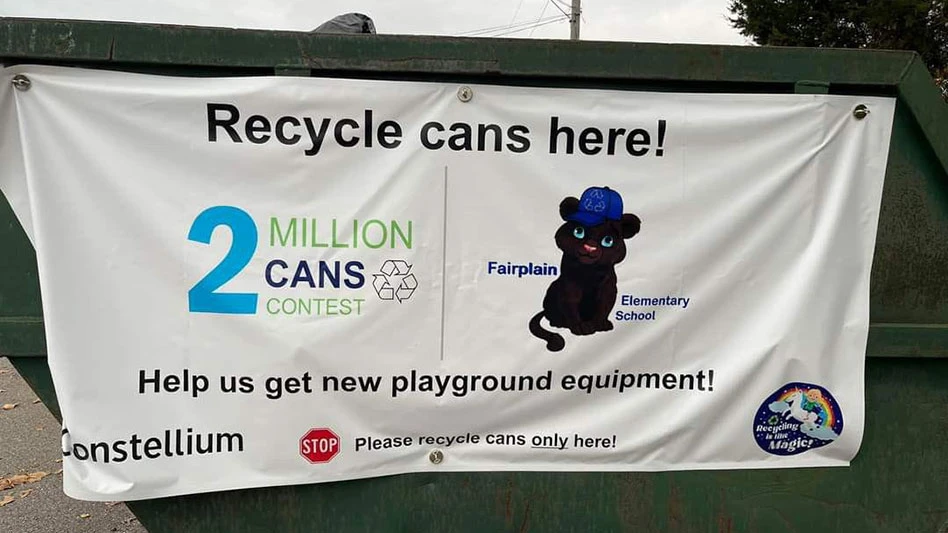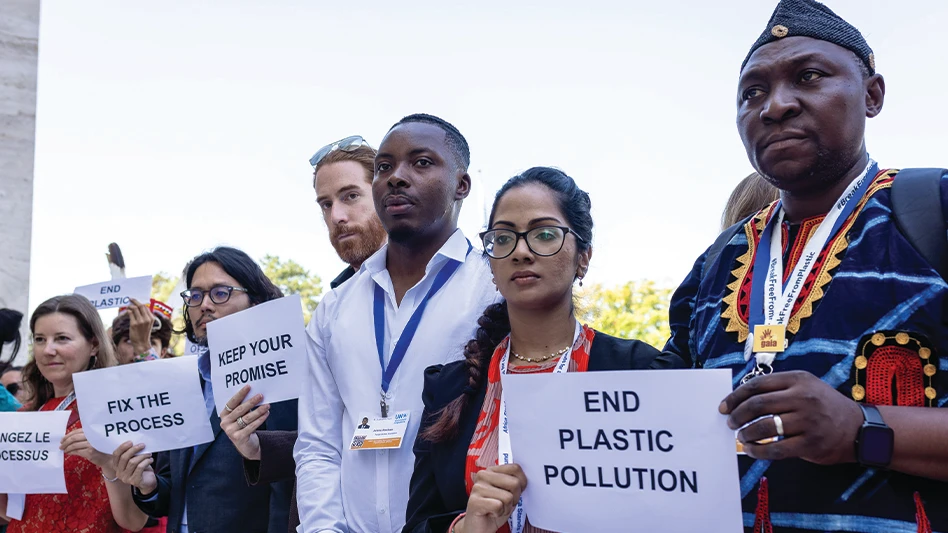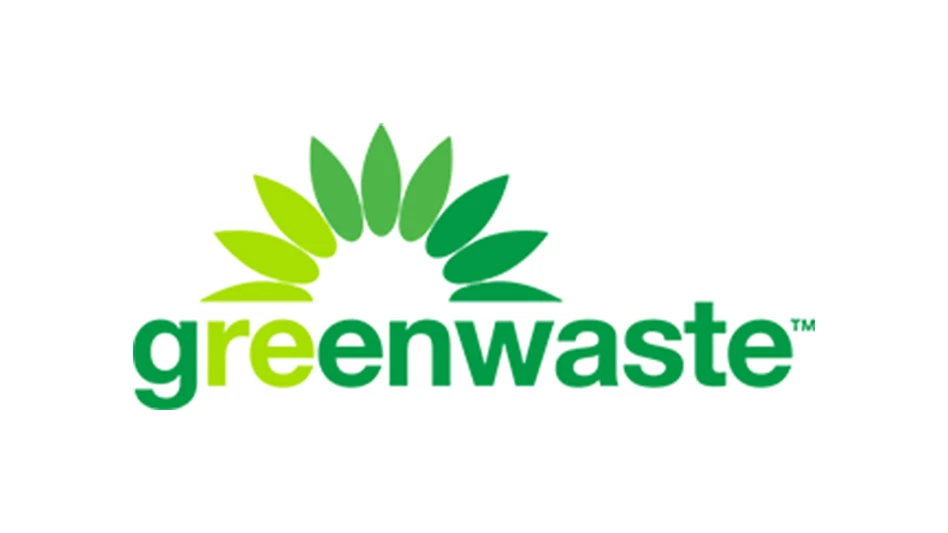 High-density polyethylene (HDPE) recycling company Envision Plastics has emerged as a leader in the plastics recycling sector since its founding in 2001. Tamsin Ettefagh, vice president of sales and marketing and a co-owner of Envision, says the company’s success results in part from its focus on optically sorting the colored HDPE bottles it receives so it can compound the material into specific colors. She also attributes Envision’s success to its ability to produce recycled bottle-grade HDPE, which it markets as EcoPrime™, for use in direct-contact food packaging. The company is the only recycler to hold this distinction for HDPE, Ettefagh says.
High-density polyethylene (HDPE) recycling company Envision Plastics has emerged as a leader in the plastics recycling sector since its founding in 2001. Tamsin Ettefagh, vice president of sales and marketing and a co-owner of Envision, says the company’s success results in part from its focus on optically sorting the colored HDPE bottles it receives so it can compound the material into specific colors. She also attributes Envision’s success to its ability to produce recycled bottle-grade HDPE, which it markets as EcoPrime™, for use in direct-contact food packaging. The company is the only recycler to hold this distinction for HDPE, Ettefagh says.
“Our quality is good enough for bottles and film along with an array of other products,” she adds.
Bottles and Beyond
The company’s processing plants are in Chino, Calif., and Reidsville, N.C., which also is home to its headquarters. Together, these two plants recycle between 140 million and 150 million pounds, or 70,000 to 75,000 tons, of HDPE per year, Ettefagh says. This material comes from various material recovery facilities (MRFs) across the U.S., including the network of MRFs operated by Charlotte, N.C.-based ReCommunity, with which Envision has a supply contract.
While blow molders of bottles are the primary consumers of Envision’s postconsumer recycled HDPE, the company also supplies manufacturers of film, sheet, pipe, toys, personal care tubes and thermoformed containers, Ettefagh says.
She stresses the need for diversified end markets in an effort to combat the seasonality that is common in the pipe manufacturing industry, which is traditionally the No. 1 consuming market for recycled HDPE. While the bottle market is fairly consistent in terms of demand, Ettefagh says, slight seasonal increases or decreases are common. Envision tends to see demand from bottle blow molders increase in March and October and decrease in July, when many plants retool, and in December.
Ettefagh adds that the automotive industry is a growing consumer of postconsumer recycled HPDE. The material previously had trouble penetrating this sector because of issues related to odor, she says. However, Envision has technology to devolitize the plastic, removing odors that linger from products such as fabric softener, for example, so the recycled material can be used in automotive seats and air conditioning ducts.
Envision’s acquisition of Union Carbide’s assets is the origin of its many innovations over the years.
In the Beginning
Massoud Rad and Parham Yedidsion founded Envision Plastics in 2001. “In 1997, they bought the Union Carbide HDPE recycling plant, which did not include the building,” Ettefagh says. “The two spent the following three years looking for a place to move the equipment into and restart the HDPE recycling business.”
 The business partners finally bought FCR’s plastics recycling plant in Reidsville in early 2001, integrating the Union Carbide equipment into the facility. Ettefagh says they also took over the space that had previously been occupied by the Barron Industries’ sheet plant.
The business partners finally bought FCR’s plastics recycling plant in Reidsville in early 2001, integrating the Union Carbide equipment into the facility. Ettefagh says they also took over the space that had previously been occupied by the Barron Industries’ sheet plant.
Shortly after Rad and Yedidsion purchased the FCR facility in Reidsville, the business partners took over operations at USPL’s HDPE recycling plant in Chino in October 2001. They ended up buying this facility as well, Ettefagh says.
Among the assets that Envision purchased from Union Carbon was the company’s Prisma sorting technology. “Originally when we bought it, it could only see 250,000 shades of color,” she says. “Since then, we are able to see 40 million and now have between our two companies over 20 years of data to know how a minor tweak to change one color affects all the other remaining colors. This has allowed us to optimize our sorting capabilities.”
Envision markets its color-sorted plastics under the Prisma™ brand.
In addition to its color sorting capabilities, Envision also has figured out how to remove perfume odors from colored HDPE in its pursuit to produce food-contact-grade recycled HDPE. “This allows us to sell into markets where odor is a sensitive area,” Ettefagh says.
Despite Envision Plastics’ capabilities with color sorting, demand today favors natural HDPE, she says. Therefore, the company has ramped up production in this area. Envision also is working to create some new colors so it can produce less utility grade mixed colored HDPE, for which Ettefagh says there is very little demand.
She adds, “We have also recently installed our food-grade technology in our Chino plant, so we can shift some of our sales [there] over to this better margin business.”
Ongoing Concerns
While Ettefagh has dedicated her career to increasing end markets for recycled plastics (See sidebar “From Volunteer to Vice President.”), a number of issues still confront the continued expansion of postconsumer plastics recycling.
Envision Plastics at a GlanceExecutive Team: Founded by Massoud Rad and Parham Yedidsion, who serve as president and CEO, respectively, and Tamsin Ettefagh, vice president of sales and marketing (pictured at top), who also has an ownership stake in the company Year Established: 2001 Locations: Headquarters and processing plant in Reidsvillle, N.C., with a second processing facility in Chino, Calif. No. of Employees: 69 in Reidsville and 36 in Chino, for a total of 105 Processing Volume: 70,000 to 75,000 tons per year Products & Services: Produces and supplies postconsumer recycled HDPE (high-density polyethylene) resins to the food, beverage, personal care, consumer health care and general industries, including:
also offers toll processing, green custom design services and recycled plastic packaging consulting |
“The whole recycling industry is under pressure to expand what is collected,” she says. “As a side-effect to single stream, many MRFs started baling up the rigid containers that were in the cart.” She says this material often was shipped to China, which no longer wants it since implementing Operation Green Fence in February of this year.
Domestic PET (polyethylene terephthalate) processors do not want opaque PET containers, so these bottles, along with some other rigid plastic containers, are finding their ways into bales of colored HDPE bottles, Ettefagh says. As a result, Envision Plastics is seeing bale yield decline and is rejecting more loads of material.
Before China instituted Operation Green Fence, she says, Envision’s Reidsville plant was rejecting three to five loads of material per month. That number has grown recently, with Ettefagh saying the company rejected 10 loads in a single week in early October and 10 to 15 loads in the last week of September. She adds that the Chino plant has seen fewer issues with its incoming material than the Reidsville plant.
Ettefagh attributes this difference to market dynamics. The West Coast-based suppliers of the Chino plant choose to supply Envision even before Operation Green Fence went into effect, so quality always has been an objective for these MRFs, she says. However, many of the East Coast MRFs that supply Envision’s North Carolina plant had been shipping material overseas and only in the last year have been supplying Envision. They have yet to get their quality up to the company’s specification, Ettefagh says.
“We need to develop stronger end markets for both of these streams as well as standardize some of the packaging beyond beverages and household chemical bottles,” she says of mixed rigids and opaque PET. “Why does one sour cream container have a 20-melt HDPE and another a 50-melt PP (polypropylene)? This makes it very hard to express to the consumer what they can recycle as well as limits where these recycled containers can be sold.”
In addition to the variation seen in plastic packaging, Ettefagh says she wonders how possible extended producer responsibility (EPR) laws could affect the plastics recycling industry. “EPR is gaining momentum and could greatly affect us,” she says. Such laws could produce a beneficial effect similar to the landfill ban on plastic bottles in North Carolina, which she says has helped to increase Envision’s raw material supply. However, such laws also could be negative, she says, “because sometimes we regulate ourselves out of business.”
Ettefagh points out that Envision Plastics and other postconsumer plastic recyclers essentially rely on volunteers to supply their raw materials. “We are also the only commodity collected at curbside that is not vertically integrated with the prime material.” She says both of these factors are difficult to overcome simply by being good in business.
Looking to the Future
Despite these challenges, Envision Plastics is looking toward a horizon silhouetted with opportunities.
“We just finished expanding in volume with two new wash lines at both locations and this year adding the EcoPrime to Chino,” she says. The company has left its old wash capacity in place and has been experimenting with processing different rigid streams.
Envision also has added a fifth extruder to its Reidsville plant and is considering producing either an injection-grade HDPE or possibly even PP.
“At this time we are not interested in taking blends of olefins but rather more likely in targeting a type of polyolefin injection grade,” she says. “The Green Fence China put up helps justify our request for a segregated supply of a type of container. So, yes, you should see us running in the near future either an injection grade of HDPE or PP.”
In the meantime, Envision will focus on maintaining its consistency, Ettefagh says. “We have tried very hard to always be a buyer, which is hard to do in soft markets,” she says. “We also have tried not to give away our resin. This disrupts the economics for everyone in the industry and makes it tough to pay bills as well.”
Ettefagh adds, “Unlike a lot in this commodity business, we like to hedge and make contracts and commitments.”
From Volunteer to Vice PresidentTamsin Ettefagh, vice president of sales and marketing for Reidsville, N.C.-based Envision Plastics, began her career in plastics recycling as a community volunteer. Ettefagh, who has a degree in communications from Texas A&M, likely had no idea she would end up working in the plastics recycling sector when she began writing a newsletter for her Lochwood Park neighborhood in Dallas. Her involvement with the community newsletter led Ettefagh to start a volunteer curbside recycling program for her neighborhood in an effort to earn money for a new playground. She says that volunteer curbside program received “tremendous” participation, though it eventually moved to a drop-off program that Ettefagh herself worked for four hours every Saturday for four years. “After two years of this program and creating the first full load of HDPE (high-density polyethylene) only to be rejected, I was ready to ban all plastics,” she says. “I even got as far as writing all my neighbors to ask them to do the same.” Rather than pursue this effort, however, Ettefagh says she followed the advice of her father, who suggested that she find a better way to recycle plastics. In 1990 she began working for Partek, Vancouver, Wash., the company that rejected that first load of HDPE from Ettefagh’s neighborhood recycling program. “Partek entered into a JV with Phillips Plastics for a new recycling plant to be built in Bartlesville, Okla. Partek hired me to talk curbside programs into adding HDPE bottles to their stream,” she says. Ettefagh also was tasked with purchasing baled HDPE for the Phillips Plastics recycling plant. “After almost two years and multiple delays in starting up, I left with the CFO to start a plastics brokerage firm,” she says. That company was named Gulf National Trading. “It was extremely important to me to keep the materials flowing instead of cutting off people who I talked into collecting the bottles because we had no more room,” Ettefagh adds. She says KW Plastics, Troy, Ala., became a key account for Gulf National. In 1993 KW built a new HDPE recycling plant, and in 1994 Ettefagh left Gulf National to join KW as director of purchasing and sales. “Six years later and two more expansions, I became restless and interested in doing more than just sales, which I had moved solely into,” she says. Union Carbide’s two technologies had intrigued Ettefagh during the years she competed with the company, she says. Therefore, when Massoud Rad and Parham Yedidsion approached her about joining their new company, Envision Plastics, which they formed after buying Union Carbide’s HDPE recycling assets, Ettefagh was interested, but only if she could have an ownership stake in the company. “It was one of the best moves I could have made,” she says of her decision to join Envision. She adds that she is impressed by the capabilities of the company’s technology and that she most enjoys getting new industries to consider using recycled HDPE in their products. “Right now I am enjoying the impact I am making and the growth Envision has made in its 12 years in business.” |
The author is managing editor of Recycling Today and can be contacted via email at dtoto@gie.net.

Explore the December 2013 Issue
Check out more from this issue and find your next story to read.
Latest from Recycling Today
- SAFE calls for export ban on certain types of aluminum scrap
- Aqua Metals reports Q2 results
- Sourgum launches services in Mississippi
- PLASTICS provides FFRA, staffing updates
- Metals Innovation Initiative announces competition to address problems in Kentucky’s metals industry
- Dow, Mura Technology cancel chemical recycling plant in Germany
- Brightmark, Lewis Salvage partnership processes 1M pounds of medical plastics
- US paper recycling rate, exports down in '24





